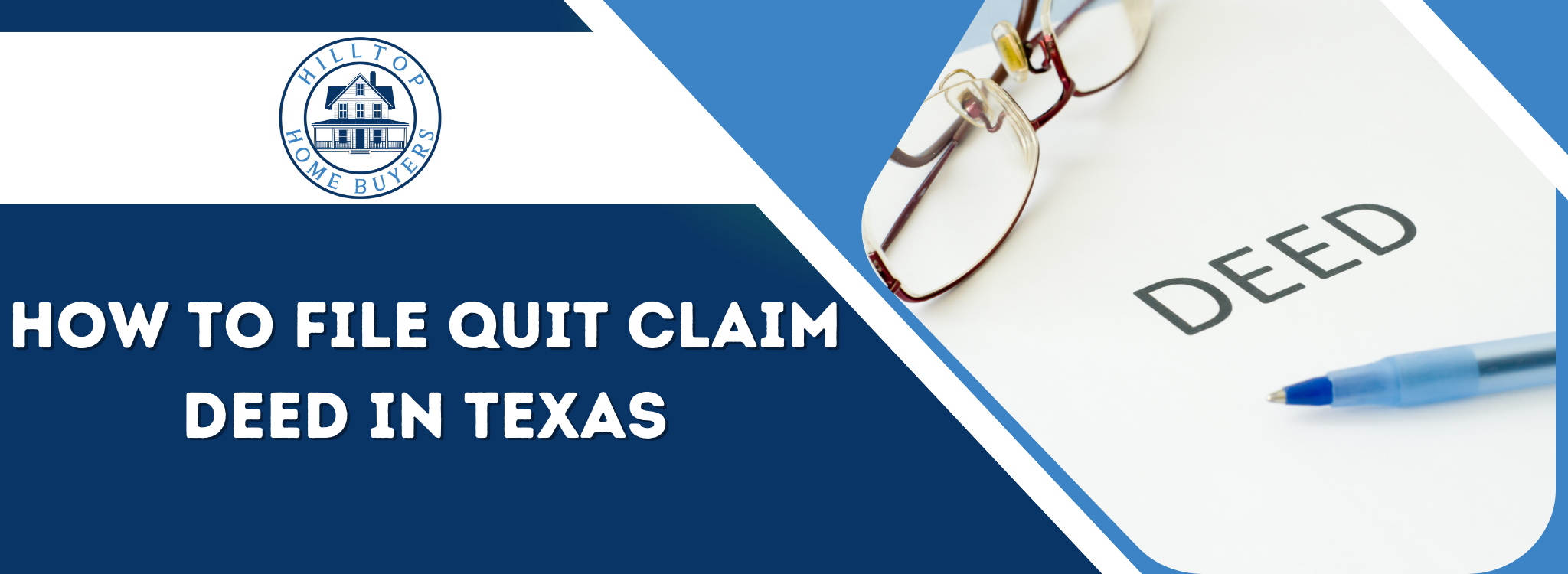
What Is a Quit Claim Deed?

A quit claim deed is a legal document used in real estate to transfer property ownership. Unlike other deeds, a quitclaim deed does not guarantee that the title is clear or free from claims. It’s commonly used to transfer property between family members, settle disputes, or place property in trust.
How Does It Differ from a Warranty Deed?
The main difference between a quit claim deed and a warranty deed is the level of protection they provide. A warranty deed ensures that the seller has good legal rights to the property and that no one else has claims against it. On the other hand, a quit claim deed simply transfers whatever interest the grantor has without any promises about the property’s title.
When Should a Quit Claim Deed Be Used?
Quit claim deeds are suitable for a simple property transfer without guarantees. This includes:
- Family property transfers
- Resolving ownership issues
- Adding or removing a co-owner
- Putting property into a trust
These scenarios show how useful a quit claim deed can be when everyone involved understands their rights and the condition of the title.
Why File a Quit Claim Deed in Texas?

A quit claim deed can be useful because Texas has its own set of real estate rules. It makes selling or giving away property easy without needing full title promises. This can help people who want to change property records quickly and with little trouble.
What Are the Benefits of Using This Document?
There are several benefits to using a quit claim deed, especially in estate planning:
- Simplicity: The process is straightforward and needs little paperwork.
- Quick Process: Transfers happen quickly and are suitable for immediate changes.
- Clarity in Transfer: Clearly shows changes in ownership, reducing confusion.
These benefits make quit claim deeds popular for fast property transactions.
Are There Specific Situations Suited for Quit Claim Deeds?
Quit claim deeds work well in certain cases, such as:
- Family Transfers: Moving property titles between relatives.
- Co-Ownership Adjustments: Changing shares among co-owners without affecting the entire title.
- Inheritance: Easing the division of estates or heirlooms.
- Divorce or Marital Property Settlements: Quickly changing ownership after a divorce.
In these cases, a quit claim deed is an effective tool for property transfers.
Please contact Hill Top Home Buyer directly for further assistance or legal advice regarding quit claim deeds. It’s always best to consult a legal professional to ensure a quit claim deed is right for your needs.
Who Can Prepare a Quit Claim Deed?

A quitclaim deed is a legal document that transfers property ownership from one person, called the grantor, to another. This deed does not guarantee the property’s title and is often used among family members or during divorce settlements. Although you can prepare a quitclaim deed independently, you might want to consider professional assistance.
Can I Prepare It Myself or Do I Need an Attorney?
Many people ask if they can create quitclaim deeds by themselves or if they should get legal advice from an attorney. You can prepare it yourself if you are comfortable with legal documents. However, an attorney can offer useful guidance to ensure the deed meets all legal requirements and avoids future problems. Seeking advice from a legal expert is recommended, especially for complex property transfers.
What Information Must Be Included in the Document?
When writing a quitclaim deed form, you must include specific information to make it legal. These are:
- Grantor’s Information: The full legal name of the person transferring the property.
- Legal Description of the Property: A detailed description of the property being transferred, usually found in previous deeds or tax records.
- Property Address: The physical location of the property.
- Grantee’s Information: The full legal name of the person receiving the property.
- Notarization: The document needs to be signed by a notary public to be legally valid.
Including all necessary information accurately helps avoid disputes and legal issues later on.
Where can you Obtain Quit Claim Deed Forms in Texas?
Getting the correct form is vital if you need to execute a quitclaim deed in Texas. There are several ways to obtain these legal forms locally and online.

Are There Official Sources for These Forms?
If you are looking for official sources for quitclaim deed forms in Texas, begin with government resources. Local county clerk offices may offer these forms, and some counties provide downloadable forms from their websites. Official government websites are trustworthy sources that ensure compliance with state-specific real estate regulations.
Can I Use Online Templates for Filing?
Online templates for filing quitclaim deeds are easy to find and use. Still, it’s important to be careful. Ensure the online template follows Texas legal standards and includes all required parts of the legal document. While an online service can save money, reviewing the completed document with an attorney can prevent possible legal issues.
Consider consulting with a qualified attorney for personalized legal advice tailored to your situation. This ensures that your quitclaim deed is valid, protecting both the grantor and grantee involved in the property transfer.
How to Ensure Accurate Legal Descriptions in Texas?
Why Is the Legal Description Important?
A legal description is key in any real estate deal because it clearly defines a property’s location, boundaries, and size. In Texas, having an accurate legal description is necessary for deeds and other property documents to be valid. This clarity helps protect property rights by removing any confusion about the specific real estate. Focusing on the legal description can prevent future disputes over property lines and ownership when preparing or reviewing a Texas deed.

What Tools Can Assist in Finding the Legal Description?
Several tools and resources can help ensure a property’s legal description is precise:
- Online Resources: Websites that offer access to property records and databases are crucial for obtaining legal descriptions. Many Texas county clerk offices provide online portals for this information.
- Survey Services: Hiring professional surveyors can give accurate measurements and property boundary descriptions, thus minimizing errors.
- Property Records: Checking documents held by the county clerk can reveal historical data and current legal descriptions.
- Maps: Plat maps and geographic information systems (GIS) help visualize property boundaries.
- Real Estate Professionals: Experienced agents often have access to resources and networks that make it easier to get accurate legal descriptions.
What Role Does Notarization Play in Filing?
Why Is a Notary Required to Quit Claim Deeds?

Notarization in Texas is vital in authenticating documents like quitclaim deeds. A notary confirms the identity of signatories and ensures signatures are made willingly and knowingly, offering legal assurance under Texas law. This process helps prevent fraud and confirms the legitimacy of document transfers.
How Can Remote Online Notarization Be Utilized?
Remote Online Notarization (RON) is becoming more common, providing convenience and security in real estate transactions. Under Texas law, RON allows notarizations to happen online using secure platforms. This makes it easier for people who cannot attend in person while maintaining the notarization process’s legality and security through strict measures.
If you need further assistance or have questions about real estate transactions in Texas, consider consulting a qualified legal professional or contacting Hill Top Home Buyer for expert advice.
What Fees Are Associated with Filing a Quit Claim Deed?
Knowing the associated fees is important when transferring property ownership using a quitclaim deed. These fees can vary depending on the location and specific county requirements in Texas. Estimating these costs accurately helps avoid unexpected expenses during the filing process.

Are There Ways to Estimate Filing Costs?
Estimating the filing costs for a quitclaim deed involves several steps. In Texas, these costs can vary by county. Here’s what you should do:
- Contact the County Clerk’s Office: Contact the county clerk of the county where the property is located. They can provide details about the filing fees for quitclaim deeds.
- Evaluate Additional Costs: Be aware of potential extra costs, such as notary fees or document preparation services. These can increase the total expense.
- Consider Property Values: Sometimes, fees depend on the property’s value. Check if this applies in your county.
Being informed about these factors can help you estimate the expenses involved in real estate transactions in Texas.
Do Fees Vary by County in Texas?
Yes, fees for filing a quitclaim deed can vary by county in Texas. Each county may set different fees for recording real estate documents. This variation highlights the need to consult the county clerk where the property is located to understand specific costs. Ensuring accuracy in all documents is essential for a smooth property transfer.
What Are Common Mistakes to Avoid When Filing?

Filing a quitclaim deed without errors is crucial to prevent legal problems. Common mistakes include:
- Incomplete Documentation: Ensure all required information is complete and accurate.
- Incorrect Property Description: Double-check that the property description matches official records.
- Failure to Notarize: A properly notarized deed cannot be legally recorded.
Avoiding these mistakes helps protect against risks and ensures legal entities in Texas recognize the deed.
How Can Errors Be Corrected After Filing?
If errors occur after filing a quitclaim deed, correcting them is important. The process includes:
- Identify the Mistake: Determine if the error is minor or materially affects the deed.
- Consult Legal Assistance: Legal advice may be needed to amend the document and avoid further issues.
- File a Corrective Document: Submit a corrective deed to address inaccuracies in the original filing.
These steps can help reduce risks and keep the real estate documentation valid.
What Are the Risks of Incomplete Documentation?
Incomplete documentation poses several risks, including possible legal disputes and challenges in property transfer. These risks include:
- Legal Issues: An incomplete quitclaim deed may lead to questions about ownership status.
- Potential Disputes: Any inaccuracies can cause disputes between parties involved in the property transfer.
- Delayed Processing: Missing information or signatures can delay the official recording.
To minimize these risks, review all documents thoroughly before filing. If unsure, consider seeking legal advice to comply with Texas real estate laws.
How Long Does It Take to Process a Quit Claim Deed in Texas?
In Texas, processing a quitclaim deed involves filing and recording the deed with the county clerk to make the property transfer official. Typically, this process takes a few weeks. However, the exact time can vary based on several factors.

What Factors Affect Processing Time?
Several factors influence the time it takes to process a quitclaim deed in Texas:
- County: Different counties have varying workloads and procedures, affecting processing times.
- Filing Fees: Processing begins after payment of the required filing fees.
- Legal Documents: All legal documents must be correctly completed and submitted to avoid delays.
- Procedures: Counties may have unique procedures due to state and local laws.
Knowing these factors can help you anticipate delays in processing a quitclaim deed.
Is Immediate Recording Available?
Some Texas counties may offer immediate recording of a quitclaim deed, although availability depends on the county clerk’s office practices. Immediate recording can speed up the title transfer process, making the real estate transaction quicker. To qualify for immediate recording, you must submit all required documentation promptly and pay the necessary fees.
What Happens if the Quit Claim Deed Is Challenged?
If there are disputes over the property’s title or ownership, a quitclaim deed may be challenged. Legal disputes in Texas can arise from unclear property boundaries or previous claims on the property. Resolving these issues might require court intervention to address title issues and validate the deed.
How Can Legal Disputes Be Resolved?
Resolving disputes over a quitclaim deed can involve several methods:
- Court: A judicial decision may be necessary to settle the dispute.
- Legal Advice: Consulting an attorney can provide guidance specific to your situation.
- Mediation: Mediation offers a less adversarial way to resolve disputes.
- Settlement: Parties may agree on a settlement to avoid lengthy litigation.
Understanding these options helps property owners address disputes effectively under Texas law.
Are There Resources for Legal Assistance in Texas?

Those needing legal assistance with real estate in Texas have several resources available:
- Attorneys: An experienced real estate attorney can offer crucial support.
- Legal Aid Organizations: These organizations provide aid services at reduced costs for qualifying individuals.
- State Bar of Texas: This organization can help find attorneys knowledgeable in Texas real estate law.
These resources are valuable for navigating the complexities of quitclaim deeds and ensuring proper handling of legal proceedings. For personalized advice, consider consulting a legal professional.
This information applies to Texas and its cities, including Irving, Plano, and Sherman. For assistance or questions, please call us at (833) 962-2274. You can also visit our website at Hilltop Home Buyer for more details.
FAQs:
What is a Quit Claim Deed and how is it used in Texas?
A Quit Claim Deed is a legal document for transferring ownership interest in a property without warranties. It is often used in Texas for straightforward property transfers among family members.
Where can I find a Texas Quit Claim Deed form?
Texas Quit Claim Deed forms are available online on reputable legal websites. Ensure the form complies with Texas state requirements.
What is the difference between a Quit Claim Deed and a Warranty Deed?
A Quit Claim Deed transfers ownership without guaranteeing a clear title, whereas a Warranty Deed ensures the grantor holds a clear title to the property.
Do I need a lawyer to file a Quit Claim Deed in Texas?
Although a lawyer is not legally required, consulting one can help ensure the deed is filled out and recorded properly, especially if complex issues like joint tenancy or liens are involved.
How does recording a Quit Claim Deed affect real estate transactions?
Recording a Quit Claim Deed with the county clerk’s office makes the transfer public record crucial for clear title history in real estate dealings.
Can a Quit Claim Deed add or remove someone from a property title?
Yes, you can use a Quit Claim Deed to add or remove a person from a property title. This is commonly done by co-owners or family members updating ownership records.
Are there any taxes involved when filing a Quit Claim Deed in Texas?
Using a Quit Claim Deed may incur taxes depending on changes in property interest. It’s best to consult a tax professional about specific tax implications.
What role does insurance play when dealing with property deeds?
Title insurance is important as it protects against potential claims or disputes over property ownership, providing security despite the limited warranty of Quit Claim Deeds.
Key Insights
- Get clear guidance on using a Texas quit claim deed form, which is crucial for real estate transactions. Understand the differences between a quitclaim and a special warranty deed.
- Our resources tackle complex legal forms like the Texas quitclaim deed, helping you grasp nuances such as joint tenancy and related tax implications.
- Stay informed about insurance considerations and how they impact property transactions, including associated premium costs.
- Explore detailed content covering legal definitions and terms like asset transfer and real estate law, which are key for navigating deed transfers.
- Gain insights into managing disputes with expert advice on litigation and foreclosure defense to protect your interests.
- Use our tools for smooth document management, offering convenient e-signature options and downloadable PDFs.
- Find information on unique circumstances, from nuptial agreements to employment law in property transactions.
- Access explanations of legal concepts such as the statute of limitations, warranties, and conditions relevant to real estate deeds.
- Learn about alternative solutions like discounted transaction methods or online services for an easy property transfer experience.
- Connect for personalized support; our team will guide you through legal processes, ensuring compliance and clarity in all transactions.


